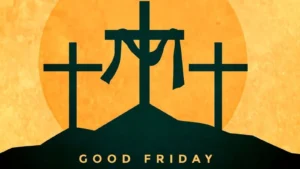Good Friday : The Day That Changed Everything

The crucifixion of Jesus Christ at the site of Calvary is commemorated on Good Friday — a Christian religious holiday. Taking place during Holy Week, the holiday is considered part of the Paschal Triduum on the Friday before Easter Sunday.
The day is also widely known as Great Friday, Black Friday, or Holy Friday. Around the world, Good Friday is a national holiday in many countries, especially in the Catholic and Anglican nations.
Fasting is the traditional way to observe this solemn day, followed by somber processions.
The exact origins of Good Friday are unknown, but the celebration dates back to the 4th century.
Fasting and putting limitations on oneself to mourn the death of Jesus is an ancient practice. Why the holiday is called Good Friday is also unknown, but there are several theories.
Some believe that ‘God’s Friday’ evolved to ‘Good Friday,’ while religious devouts firmly believe that the day is named ‘good’ as a symbol of Jesus and everything he stood for against evil-doers
HOW TO OBSERVE GOOD FRIDAY
Pray
Many Christian churches hold prayer services during the hours of Christ’s crucifixion. Many religious people observe a period of prayerful silence during this time, especially between the hours of noon and 3 P.M.
Fast
Depending on your Christian denomination, it may be appropriate to fast on Good Friday. It is a traditional day of fasting within the Catholic Church, for example.
Volunteer
Jesus stressed the need to help those less fortunate than ourselves. If your religious beliefs allow it, consider volunteering at your church or in your community on this day in the spirit of giving back.
Orthodox
Icon of the Crucifixion, 16th century, by Theophanes the Cretan (Stavronikita Monastery, Mount Athos)
Byzantine Christians (Eastern Christians who follow the Rite of Constantinople: Orthodox Christians and Greek-Catholics) call this day
“Great and Holy Friday”, or simply “Great Friday”. Because the sacrifice of Jesus through his crucifixion is recalled on this day, the Divine Liturgy (the sacrifice of bread and wine) is never celebrated on Great Friday, except when this day coincides with the Great Feast of the
Annunciation, which falls on the fixed date of 25 March (for those churches which follow the traditional Julian Calendar, 25 March currently falls on 7 April of the modern Gregorian Calendar).
Also on Great Friday, the clergy no longer wear the purple or red that is customary throughout Great Lent,[42] but instead don black vestments.
There is no “stripping of the altar” on Holy and Great Thursday as in the West; instead, all of the church hangings are changed to black and will remain so until the Divine Liturgy on Great Saturday.
What is the Significance of Good Friday?
For many people, every Friday is good.
Friday usually signals the weekend is here, and a break is coming from work. But for followers of Christ, there is one particular Friday each year that holds more significance than a normal end of the week.
And that is Good Friday. It’s the Friday before Easter, which is a holiday that moves dates on the calendar to occur on the first Sunday after the Paschal Full Moon.
Good Friday commemorates what Jesus did on the cross—willingly suffering and dying by crucifixion as an atonement for sin. In dying and being raised back to life three days later (the day commemorated by Easter), he claimed victory over death.
But what makes Jesus’ victory significant, and why was his death on Good Friday necessary?
Four ways Jesus’ victory was different than any other in history
If you look through your history books, you’ll be hard-pressed to find a story where the main protagonist dies in victory.
More often, history and stories tell how the victor destroys the enemy, but Jesus is a different kind of Savior and gives us a different kind of life to emulate. Consider these four ways that Jesus’ victory over death is unique.
 1. Jesus gave up his life to claim the victory
1. Jesus gave up his life to claim the victory
Jesus calls himself “the good shepherd” in John 10:11, saying, “The good shepherd lays down His life the sheep.”
This idea is the opposite of the stories that are told about great leaders going into battle and being victorious.
To “win,” an earthly strategy for battle never involves the leader purposefully laying down their life. But in John 10:17-18 (NIV), Jesus tells us that his command from his Father (God) is to lay down his life
“The reason my Father loves me is that I lay down my life—only to take it up again. No one takes it from me, but I lay it down of my own accord. I have the authority to lay it down and the authority to take it up again. This command I received from my Father.”
2. Jesus didn’t fight those who persecuted him
Jesus did not come to earth with an army to overtake his enemies and rule. When brought before Pontius Pilate for trial, Jesus was asked, “Are you the King of the Jews?” Jesus replies, “My kingdom is not of this world. If it were, my servants would fight to prevent my arrest by the Jewish leaders. But now my kingdom is from another place” (John 18:33, 36 NIV).
Before he was arrested and taken away from his disciples, Jesus withdrew to the Garden of Gethsemane to pray for strength for what was to come next (Matthew 26:36-46).
And when Judas betrayed him, Jesus allowed it to happen (Matthew 26:47-50).
Then, Jesus rebuked Peter when he attacked one of the men who were arresting Jesus, saying in Matthew 26:53-54, “Do you think I cannot call on my Father, and he will at once put at my disposal more than twelve legions of angels? But how then would the Scriptures be fulfilled that say it must happen in this way?”
With every false accusation leveled against him, Jesus only spoke the truth of who he is (Matthew 26:54). And finally, as he hung on the cross, Jesus prayed for the forgiveness of the people who had put him on the cross (Luke 23:34).
3. Jesus knew that he wasn’t fighting a physical, earthly enemy
Death was what Jesus was fighting. Because of sin, death has a hold over man.
As the Bible says in Romans 5:12 (NIV), “just as sin entered the world through one man, and death through sin, and in this way death came to all people because all sinned.”
Or as Romans 5:12-17 is summarized in an article from Christianity Today, “Death was the enemy; sin was its champion; and Jesus would conquer them both, with resurrection as the proof of his victory.”
The Apostle Paul recognized that the war being waged was not of this earth when he wrote the church at Ephesus saying, “For our struggle is not against flesh and blood, but against the rulers, against the authorities, against the powers of this dark world and the spiritual forces of evil in the heavenly realms” (Ephesians 6:12 NIV).
4. Jesus’ victory was not a momentary one, but an eternal one
In Revelation 21:4 (NIV), we see a glimpse of what is to come in heaven.
“He will wipe away every tear from their eyes, and death shall be no more, neither shall there be mourning, nor crying, nor pain anymore, for the former things have passed away.”
With his death on the cross and resurrection three days later, Jesus declared a once and for all victory over death and destroyed its ultimate power over our life. And at Christ’s return, we will see that “death has been swallowed up in victory” (1 Corinthians 15:54b NIV).
Why did Jesus have to die?
Good Friday focuses on Jesus’ death, while Easter celebrates his resurrection. But what was the purpose of Jesus’ death?
Was there no other way for the victory to be won?
We see Jesus show his humanity when he submits to the will of God while praying in the Garden of Gethsemane, “My Father, if this cup can’t be taken away unless I drink it, may your will be done” (Matthew 26:42 NIV).
Jesus knew that his death was necessary, and here’s why.
Take our punishment for sin
From Romans 6:23 (NIV), we know that the wages of sin are death. It’s what God required. Jesus took the punishment that we deserved.
Be our innocent sacrifice
We see throughout the Old Testament that the people of Israel would sacrifice innocent lambs for their sins.
 प्रभु येशुनी, आपल्या सर्वांसाठी आपले रक्त सांडल्यामुळे, आपल्या घरातील सर्व व्यक्तींचे राज्य उभे केले. प्रभ तुझ्या प्रेमाने, आम्हाला पवित्र कर आणि नेहमी आमच्यावर लक्ष ठेवा. हैप्पी गुड फ्रायडे.
प्रभु येशुनी, आपल्या सर्वांसाठी आपले रक्त सांडल्यामुळे, आपल्या घरातील सर्व व्यक्तींचे राज्य उभे केले. प्रभ तुझ्या प्रेमाने, आम्हाला पवित्र कर आणि नेहमी आमच्यावर लक्ष ठेवा. हैप्पी गुड फ्रायडे.
तो येशू आज आपल्या केलेल्या प्रार्थनांचे उत्तर नक्की देईल … हैप्पी गुड फ्रायडे
आपल्या आयुष्यासाठी शांतपणे, आपण नेहमी आपल्या प्रार्थनांमध्ये त्याची आठवण ठेवू या.
good Friday च्या तुम्हाला शुभेच्छा.
Have a blessed Good Friday, देव तुमच्यावर किती प्रेम करतो याबद्दल कधीही विसरू नका.
Conclusion:
Read more and more
leave a comment as soon as possible.
do connect to this article triple talaq:
